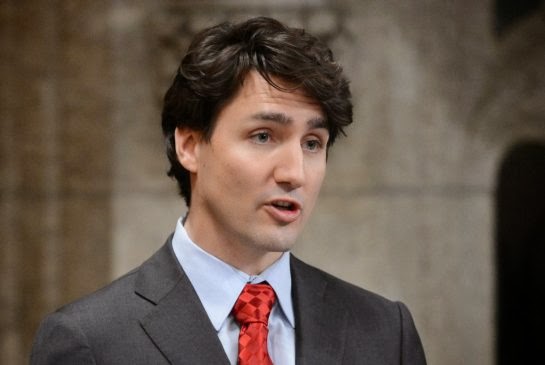
Trudeau reveals some policy stances ahead of new year
In an interview with Evan Solomon yesterday, Liberal leader Justin Trudeau revealed some of his policy stances ahead of the new year.
The Liberal strategy up to now has been to keep the policy process quiet until the next election and focus on rebuilding its grassroots base. This means news on Liberal policy stances will be slow and vague. Recently in an interview on CBC’s Power and Politics, Evan Solomon fished out some of the stances Trudeau was willing to take as curiosity continues to ensue around the new leader and renewed party.
The Arctic
The Conservatives have made a formal claim for the North Pole after years of working on establishing northern sovereignty. This is destined to lead to conflict with other nations with their eye on the prize, a region believed to be rich with oil and energy-producing resources. The notable opponent to Canada’s claim is Russia who has planted a flag in the past years and is among some northern European countries also making a bid.
If Justin Trudeau were Prime Minister, his approach to claiming the arctic would be based on science. His response to Canada’s ownership of the North Pole…
“I would certainly like to think so, because everyone knows that Santa Claus is Canadian. But the real issue is what do the cartographers say? What do the experts in science [say]?” Trudeau said.
He added Harper’s belief that the North Pole was Canadian didn’t go far enough.
“This is a UN mapping process that’s been going on for 10 years … scientists need to demonstrate that we have a legitimate claim on the North Pole. Of course I want us to declare as much as we possibly can,” Trudeau said.
“We need to base our decisions on science, not chest thumping.”
Budget Surplus
The Conservatives are claiming there will be a surplus before 2015, which they’ll say is proof of their economic competence. The funny thing is they inherited a surplus and turned it into a deficit before the recession. When the recession struck, the deficit ballooned to the highest it’s been in history, $56 billion. The Conservatives promised in 2011 that when they got their surplus, they would implement their popular income splitting tax policy that would halve the tax burdens of couples.
If Justin Trudeau were Prime Minister, this is what he would do with a budget surplus:
“I think I’d work on making sure that Canadians have opportunities to find good jobs, to grow, to gain stability in terms of pensions. The reality is that Canadians don’t feel that our economy is working for us. We need to make sure that the middle class gets … the first raise in 30 years.”
Trudeau finds income splitting to be “A decent idea, but it doesn’t help the most vulnerable. So there’s advantages in some ways, but it’s not exactly the panacea that they’re pretending it is.”
Corporate Taxes
The Conservatives have followed the Liberal plan to reduce corporate tax rates and continued to do so throughout the recession. As a result, Canada now has the lowest corporate tax rates among G8 nations. In 2011, the Liberals sided with the NDP to advocate for a corporate tax hike which, among other policy stances, drove Canadians to flock to the Conservatives or the NDP.
If Justin Trudeau were Prime Minister, here’s how he would deal with corporate tax rates:
“I think we’re pretty much where we need to be on corporate taxes. I felt that during the recession it wasn’t the time to decrease further corporate taxes, but where they are right now is something OK with me.”
Environmental Policy
Canada has a black eye on environmental policy on the world stage, but none of the existing solutions have gained traction or credibility. There is no evidence that a carbon tax, a policy the Liberals once advocated (and lost a good number of support for), would reduce greenhouse gases sufficiently and not pose as a gauge on struggling Canadian families – Australia is in the process of reversing its carbon tax. Cap and trade, a solution the NDP is advocating, doesn’t have much scientific merit behind it either. The Conservatives chose the regulation route, which hasn’t worked and likely added unnecessary red tape and bureaucracy which is costing taxpayers dearly.
If Justin Trudeau were Prime Minister, here’s how he would deal with environmental policy:
“I think we need to price carbon, there’s no question about it. The way we do it needs to be based on science and not political debates and attacks, and that’s why I’m drawing on experts and best practices from around the world.”
Russia’s Homophobic Laws
Russia has come under international scrutiny for passing laws that make homosexuality illegal and the punishments have been severe at best. The Harper government hasn’t taken a clear stand on the issue and as other countries condemn and withdraw participation in the upcoming Olympic games in Russia, Canada has done nothing…
If Justin Trudeau were Prime Minister, here’s how he would deal with Russia’s violation of human rights:
“My stance would be to point out that it’s absolutely unacceptable that they have these hateful laws within their country that is aspiring to be a full partner around the table of nations as a pseudo-democracy. And that for me is not good enough,” Trudeau said.
The law “fundamentally disrespects a significant proportion of its population,” he added.
These new stances follow his existing significant stances of leaving the gun registry in its grave and supporting the keystone pipeline, among others. What do you think of Trudeau’s stances up to now?



